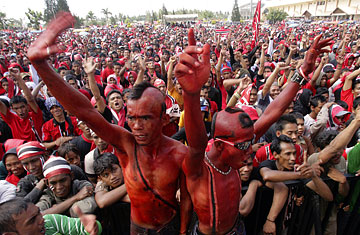
Supporters of the Aceh party coloured in Red, chant slogans during a rally in Banda Aceh April 1, 2009.
With less less than a week to go before national elections, snarled logistics and accurate voter rolls could spell disaster for the more remote regions of Indonesia. But Aceh, a province of four million people on the northern tip of Sumatra, is facing security challenges as well. After a string of attacks by unidentified gunmen over the past three months, the central government is planning to send an additional 1,000 soldiers and 260 national police to join an estimated 9,000 local police officers to help stabilize the restive province. At least 16 people have been killed in shootings and grenade attacks that have heightened suspicions between former separatist rebels from the Free Aceh Movement (GAM) and the military. "The authorities need to ensure security and make sure the elections will be held in an atmosphere that is conducive," says Usman Hamid, head of the human rights watchdog Kontras, based in Jakarta. "If not spoilers could undermine the process."
Aceh's hard-won peace, officiated by a 2005 agreement between GAM representatives and government officials, has allowed the Acehnese to rebuild their lives and communities after three decades of fighting and the devastation of their province in the 2004 tsunami. Some 170,000 people in the province were killed the disaster. "There is little danger in the short term of violence escalating out of control, let alone a return to armed conflict," Sidney Jones, senior adviser to the International Crisis Group (ICG), wrote in a recent report. "But the underlying causes of the tensions are not just election-related and need to be addressed if peace is to be preserved in the long term." (See pictures from Aceh after the tsunami.)
Those tensions stem mainly from the military's fear that many members of the Partai Aceh, or Aceh Party, still harbor dreams of independence. Others agree that the attacks, some targeting the offices of the Partai Aceh, the political vehicle established by separtist supporters, could be the surfacing of new internal feuds between former rebels. Others aren't as sure. "There has been some violence and harassment but I'm not sure they can be associated with politics," says Humam Hamid, a sociology professor at Syah Kuala University in Aceh."They could also be purely criminal acts, which happen everywhere." Regardless, many Acehnese are predicting victory for the Partai Aceh, one of six local parties joining 38 national parties in the legislative elections on April 9. "I think Partai Aceh will get the majority but am not sure by how much," predicts Humam. A local businessman expects it to be a landslide. "I think they could get as much as 75%," says Muni Hamid.
Concerns are growing nationwide over whether the General Elections Commission will be able to carry out and monitor the elections effectively. More than 170 million Indonesians are registered to vote in the upcoming elections that will determine the fate of President Susilo Bambang Yudhoyono, who is seeking a second term and a majority in Parliament for his Democratic Party. The fate of his vice president, Jusuf Kalla, who helped broker the Aceh peace agreement signed in Helsinki in August 2005, is less clear, as his Suharto-era Golkar party is struggling to maintain the same number of seats as it won in 2004, when it finished on top.
Like the rest of Indonesia, Aceh is grappling with near double-digit unemployment, a figure that could quickly rise following the departure this month of the Aceh Reconstruction and Rehabilitation Agency, the public body tasked with administering billions of dollars of international aid and donations to rebuild the province after the tsunami. Tremendous progress has been made in rebuilding homes and public facilities, but some fear those gains could be lost and the peace process jeopardized if elections are not viewed as free and fair. Free and fair elections are a national concern, but some fear the Acehnese will be afraid to go out and vote if they don't feel the electoral atmosphere is safe. "I would be very worried if the Acehnese are not allowed to exercise their right to vote," adds Usman. "I cannot imagine that all of the (rebel) weapons have been demolished, and there is no guarantee that violence won't break out.
Humam dismisses the fears as alarmist. "People had similar doubts about the last elections and also about maintaining the peace," says Humam, who failed in his bid to be elected governor in provincial elections in 2006. Government officials share his optimism, calling the recent series of grenade attacks "the exception, not the rule," and assert that safety precautions have been taken. "On April 9 you will see the elections carried out freely and fairly like everywhere else in Indonesia," states a confident presidential spokesman Andi Mallarangeng, who recently made a visit to the province with the President. "Those against the process of peace will be seen as going against all the Acehnese people."
